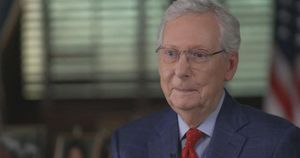New Delhi: The Ministry of Home Affairs announced on February 12, 2025, the imposition of President's Rule in Manipur. This decision follows the resignation of Chief Minister N Biren Singh just days earlier amid rising ethnic violence and political unrest.
President Droupadi Murmu's official notification stated, "Whereas, I, Droupadi Murmu, President of India, have received a report from the Governor of the State of Manipur and after considering the report and other information received by me, I am satisfied..." This proclamation deemed the situation such, where the state government was unable to function according to the Constitution.
Since May 2023, Manipur has been embroiled in violence between the Meitei community and the Kuki-Zo tribes, with reports indicating over 250 fatalities and mass displacements. The unrest questioned Singh's leadership capacity, prompting his resignation on February 9, after several significant political developments, including pressure from the Congress party and mounting public dissatisfaction.
Upon resigning, Singh expressed gratitude for the central government's interventions during his term, stating, "It has been an honour to serve the people of Manipur..." His departure, perceived as delayed by his opponents, triggered assertions from Congress leaders, including Rahul Gandhi, who criticized Singh and the central government for their handling of the crisis.
Congress general secretary Jairam Ramesh went public with his sentiments, asserting, "Finally what the Indian National Congress has been demanding for almost 20 months has happened. President's Rule has been imposed in Manipur." His remarks reflect the party's contrasting stance to the ruling BJP, which faced criticism for its inability to stabilize the state.
This historic imposition of President's Rule, the 11th since 1951, translates authority from the state government directly to the central government under Article 356 of the Indian Constitution. The notification underscored, "The powers of the legislature of the said State will be exercisable by or under the authority of Parliament," and indicated the assembly would be placed under "suspended animation." This significant administrative shift raises concerns about the future direction of governance and stability within the state.
The BJP for months struggled to find consensus among lawmakers for Singh's potential successor, complicates the political narrative as the assembly was due for reconvening. Party representatives, including Sambit Patra, attempted to forge unity among senior leaders, but left multiple meetings without resolution.
Political pressure intensified with the looming threat of no-confidence motions and Supreme Court investigations concerning evidence indicating Singh's alleged involvement and instigation of the ethnic discord. Some leaked audio tapes purportedly featured Singh acknowledging his role, which alarmed both the public and political opponents.
With Parliament's proceedings and the Prime Minister absent from the country, the central government acted swiftly to impose President’s Rule, reflecting the urgent necessity to re-establish effective governance under the Constitution. Historically, President's Rule has been invoked to centralize power when regional parties are unable to deliver appropriate governance, marking the situation's severity.
The transition to central rule will place Manipur's administrative control under the governor's oversight, seeking to restore order amid chaos, but raises fears among residents about the degradation of local autonomy. Critics of the central government interpret the move as admitting to previous failings.
The previous period of President’s Rule lasted from 2001 to 2002, with earlier impositions highlighting the cyclic nature of crisis and intervention within Manipur. With ethnic groups still clashing and numerous appeals for calm from civil leaders, the path to stability appears fraught with difficulties.
Opposition leaders continue to challenge the BJP government, with various civil society groups also calling for accountability. The importance of addressing the root causes of the ethnic conflict remains urgent.
Moving forward, the political future of Manipur remains uncertain as residents seek answers to the challenges they face under direct central rule. The ramifications of this change will likely resonate throughout the region as the governor steps in, but those closely observing Manipur's condition remain watchful of the situation's evolution.



